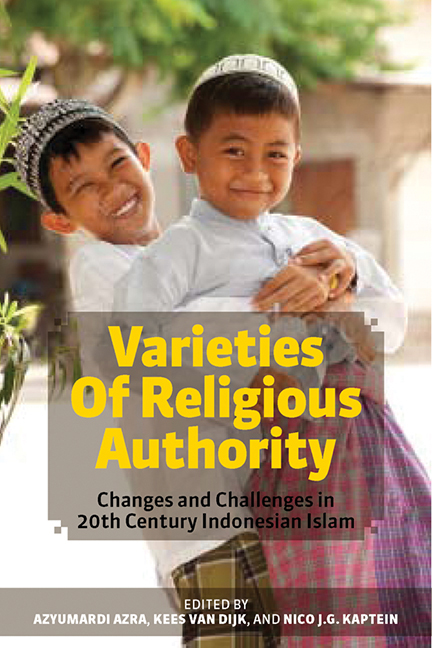Book contents
- Frontmatter
- Contents
- About the Contributors
- Acknowledgements
- Introduction
- 1 The Redefinition of Religious Authority among South Asian Muslims from 1919 to 1956
- 2 Understanding Al-Imam's Critique of Tariqa Sufism
- 3 Traditional Islam and Modernity: Some Notes on the Changing Role of the Ulama in Early Twentieth Indonesia
- 4 The Role and Identity of Religious Authorities in the Nation State: Egypt, Indonesia, and South Africa Compared
- 5 Authority Contested: Mathla'ul Anwar in the Last Years of the New Order
- 6 Struggle for Authority: Between Formal Religious Institution and Informal-local Leaders
- 7 The Indonesian Madrasah: Islamic Reform and Modernization of Indonesian Islam in the Twentieth Century
- 8 From Apolitical Quietism to Jihadist Activism: “Salafis”, Political Mobilization, and Drama of Jihad in Indonesia
- 9 From handling Water in a Glass to Coping with an Ocean: Shifts in Religious Authority in Indonesia
- 10 Religious Authority and the Supernatural
- Index
5 - Authority Contested: Mathla'ul Anwar in the Last Years of the New Order
Published online by Cambridge University Press: 21 October 2015
- Frontmatter
- Contents
- About the Contributors
- Acknowledgements
- Introduction
- 1 The Redefinition of Religious Authority among South Asian Muslims from 1919 to 1956
- 2 Understanding Al-Imam's Critique of Tariqa Sufism
- 3 Traditional Islam and Modernity: Some Notes on the Changing Role of the Ulama in Early Twentieth Indonesia
- 4 The Role and Identity of Religious Authorities in the Nation State: Egypt, Indonesia, and South Africa Compared
- 5 Authority Contested: Mathla'ul Anwar in the Last Years of the New Order
- 6 Struggle for Authority: Between Formal Religious Institution and Informal-local Leaders
- 7 The Indonesian Madrasah: Islamic Reform and Modernization of Indonesian Islam in the Twentieth Century
- 8 From Apolitical Quietism to Jihadist Activism: “Salafis”, Political Mobilization, and Drama of Jihad in Indonesia
- 9 From handling Water in a Glass to Coping with an Ocean: Shifts in Religious Authority in Indonesia
- 10 Religious Authority and the Supernatural
- Index
Summary
INTRODUCTION
Mathla'ul Anwar (Matlaʿu al-Anwar) along with its madrasah was founded in 1916 by a group of Bantenese religious teachers (kiyai) as an immediate response towards both the massive introduction of secular schools by the Dutch colonial government following the issuance of the Ethical Policy and the declining effectiveness of the pesantren- (traditional Islamic boarding school) based education in providing an attractive place to study religion for Muslim youth in Banten. Mathla'ul Anwar's madrasah was to be the first modern Islamic school in the Banten region before the foundation of the Al-Khairiyah (al-Khairiyya) in Serang in 1923. From its foundation to the present, there have been seven different leaders who have acted as the general chairman of the central board of Mathla'ul Anwar, including Kiyai Haji Muhammad Yasin (1916–37), Kiyai Haji Abdul Mu'thi (1937–39), Kiyai Haji Uwes Abu Bakar (1939–72), Kiyai Haji Muslim Abdurrahman (1972–74), Haji Nafsirin Hadi (1974–85), Kiyai Haji Burhani (1985–91) and Haji Irsyad Djuwaeli (1991–up to now). Except Nafsirin Hadi and Irsyad Djuwaeli, all leaders have a similar education background, pesantren. Meanwhile, both Nafsirin Hadi and Irsyad Djuwaeli represented the alumni of the madrasah. For instance, Irsyad Djuwaeli spent his early studies at the madrasah of the Anwarul Hidayah (Anwar al-Hidaya) before continuing his study at the Religious Teacher Training (Pendidikan Guru Agama, PGA) of Mathla'ul Anwar in Jakarta. Educational background is important to see the style and orientation, as well as their acceptability among traditional members of Mathla'ul Anwar. Members of this organization would not qualify Nafsirin Hadi as a true leader of Mathla'ul Anwar due to his lack of religious expertise, while they highly admired Kiyai Uwes Abu Bakar as an example of the perfect leader due to his exceptional expertise in religious matters. Yet, authoritative knowledge in religious matters as the only referred parameter for judging the leadership in Mathla'ul Anwar does not do justice to reality as is shown in the case of Irsyad Djuwaeli's leadership.
- Type
- Chapter
- Information
- Varieties of Religious AuthorityChanges and Challenges in 20th Century Indonesian Islam, pp. 93 - 114Publisher: ISEAS–Yusof Ishak InstitutePrint publication year: 2010

